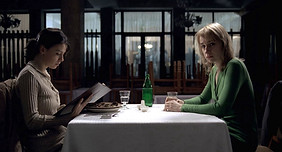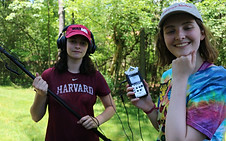Research
For the past seven years I have researched cross-cultural entertainment, exploring the intersections of gender, data, and theory in historical and media narratives. I have an MPhil in Film and Screen Studies from the University of Cambridge, and a BA in Global Studies (History) and Creative Writing (English) from Carnegie Mellon University. Currently, I am researching how to increase the accessibility and diversity of film archives at the Academy of Motion Picture Arts and Sciences.
Current Research



For more information about this project and our current work, please contact me!
As the cultural equity and inclusion project manager at the Academy Film Archive, I am working on a collaborative consortium initiative with the mission to discover, center, and share – through research and preservation – a more diverse, equitable, and inclusive film history. Our goal is to improve the accessibility of the Academy through identity-centered metadata, discover critical gaps in archival holdings, and make strategic workflows for diversifying the collection. As part of this work, we hope to launch a free, publicly accessible website with an open-access database through which users can search for films across intersectional aspects of identity-related to disability, ethnicity, gender, race, sexual orientation, and other social and cultural identities.
My research this past year has focused on redesigning the project methodology, cleaning our legacy dataset, and researching and constructing a culturally responsive controlled vocabulary metadata schema, which integrates recent developments in digital taxonomies with current best practices in reparative archival descriptions. Blending elements of a traditional controlled vocabulary with a user-generated folksonomy, our project's controlled tag vocabulary mixes high-level subject terms with source-generated and community specific terminology, creating a contained but fluid list that is accessible, responsive, and community focused.
Academic Research

Kuragehime by Akiko Higashimura

Ranma ½ by Akiko Higashimura

GENDER-BENDER MANGA
Performance, Perception, and Narratives of Subversion
MAI: FEMINISM & VISUAL CULTURE:
Gender-bending in storytelling isn’t a new phenomenon. Stories in which characters perform as or physically transform into another gender have existed worldwide since antiquity, appearing in everything from Greek and Hindu mythology and Russian and Egyptian folklore to Shakespearean and Thai theater and Italian and Chinese opera. Though a handful of stories with these themes appear in contemporary Western media, gender-bender narratives are significantly more prevalent in manga, reaching massive popularity with both Japanese and international audiences. Ranging from martial-arts fantasies (Ranma ½), to harem romances (Ouran High School Host Club), to slice-of-life comedies (Kuragehime), these works are often written and drawn by female mangaka and directly engage with, if not outright critique, the flimsy, restrictive, and ill-fitting construction of our modern gender binary.
In this paper, I explore how gender-bender manga uses a combination of embodied performance, physical space, external perception, and social positioning to deconstruct the essentialism of binary gender in relation to Judith Butler's Gender Trouble and Undoing Gender.
Ouran High School Host Club by Bisco Hatori
ART, DESIRE, AND THE FEMALE GAZE
Artemisia and Portrait of a Lady on Fire
MPhil Dissertation in Film and Screen Studies
University of Cambridge | Distinction
Though many film and feminist academics have explored various aspects of female spectatorship, scholars have not reached a consensus on a definition of the female gaze, other than as an oversimplified inversion to Mulvey’s male gaze that largely ignores the concept's psychoanalytic underpinnings. Nevertheless, the usage of the term female gaze is exponentially increasing in popular discourse, even as few can seem to agree on its implementations or implications. It is in this regard that film scholarship as a discipline and film spectatorship as a cultural practice have begun to drift apart, leaving this critical concept untethered in the void of theory.
In my dissertation, I address this disconnect and reconsider how we imagine and interpret the female gaze through two French films made by female artists about female artists. With narratives at the crux of art-making and desire, Artemisia and Portrait of a Lady on Fire are consciously engaging with questions of looking and being looked at, asking what it means to be the model of another’s gaze and the creator of one’s own. These two films, limited though they might be, are well positioned as a starting point to help us approach, investigate, and define the female gaze.
.png)

Portrait of a Lady on Fire (2019)


Artemisia (1997)


Thelma & Louise (1991)


Female Friendship as Political Resistance
Thelma & Louise and 4 months, 3 weeks, and 2 days
Senior Honors Thesis in Global Studies
Carnegie Mellon University | University Honors
Through their gritty and realistic explorations of women's friendship in the 1980s, the Hollywood blockbuster Thelma & Louise (1991), and the Romanian New Wave darling 4 Months, 3 Weeks, and 2 Days (2007) challenged the view of women in their respective culture's media, while critically engaging with the significance of female representation in a broader context. With plots that unabashedly center the controversial subjects of rape and abortion, these films ask complex questions about society, complicity, and solidarity, examining how female friendship itself can be an act of resistance against oppressive sociopolitical systems.
4 Months, 3 Weeks, and 2 Days (2007)
Creative Research






In 2016, I founded a film research collective called Momoka Studios with the aim of improving on-screen representation by diversifying behind-the-scenes participation.
I recruited, trained, and directed teams of eight to fifteen women (and other minorities in the film industry) and together we shared our technical experience to help female and minority film students get hired on professional film sets and create material for portfolios, reels, and graduate school applications.
In four years, we produced two mini-documentaries, four short narrative films, and assisted on seven other shorts. These projects were funded through the generosity of research fellowships and independent grants.
BREATHING WORDS
Breathing Words was the culmination of a year-long senior honors project that explored the portrayal of female friendship in film.
In conjunction with my thesis regarding female friendship as political resistance, Breathing Words explored the other side of this coin, showing how friendship is often intimate, inspirational, and all-encompassing. Using the framework of untranslatable words, this film set out to explore a cross-cultural friendship and the way art and language can bring us together.












PARFUM
Parfum was a semester-long research project into commodity fetishism in luxury advertisements.
Inspired by the praise a perfume's advertising campaign was receiving in the fall of 2016 for being gender expansive and groundbreaking, the team explored the aesthetics and labor practices of luxury advertisements. We looked at the underside of the perfume and modeling industries and the manner in which women and minorities are often portrayed in the selling of a desirable and unachievable lifestyle.
CTRL_ALT_DELETE
Ctrl_Alt_Delete was a six-week research project that examined the historic normalization of domestic abuse in science fiction.
From coercive heroes and programmed love interests, to explicitly non-consensual encounters and sexually subservient androids, our team researched the trends that permeate the science fiction genre, investigating how these stories can offer imaginative possibilities of the future, while also perpetuating the misogynistic injustices of the present.












PSYCHE
Psyche was a year-long research project that explored the trends in coming-of-age queer media.
Responding to the trends in queer media in the late 2010s, the team researched the ways LGBTQ+ people's coming-of-age stories are often inextricable from coming-out stories, and how the majority of queer media (at the time) was explicitly sexual or inevitably tragic.



